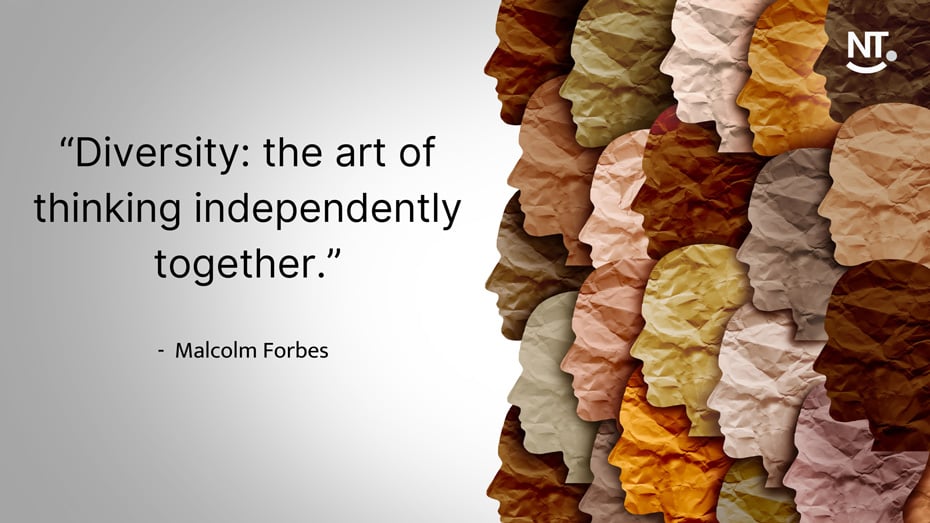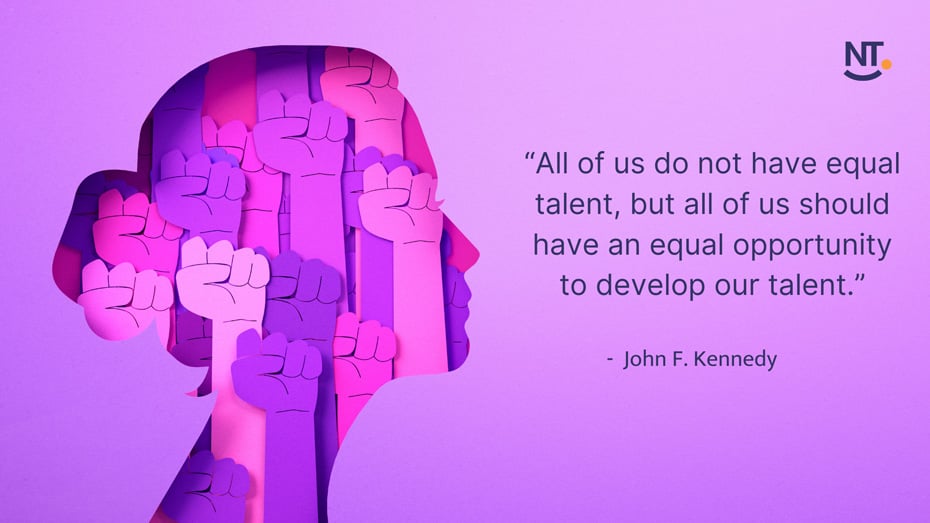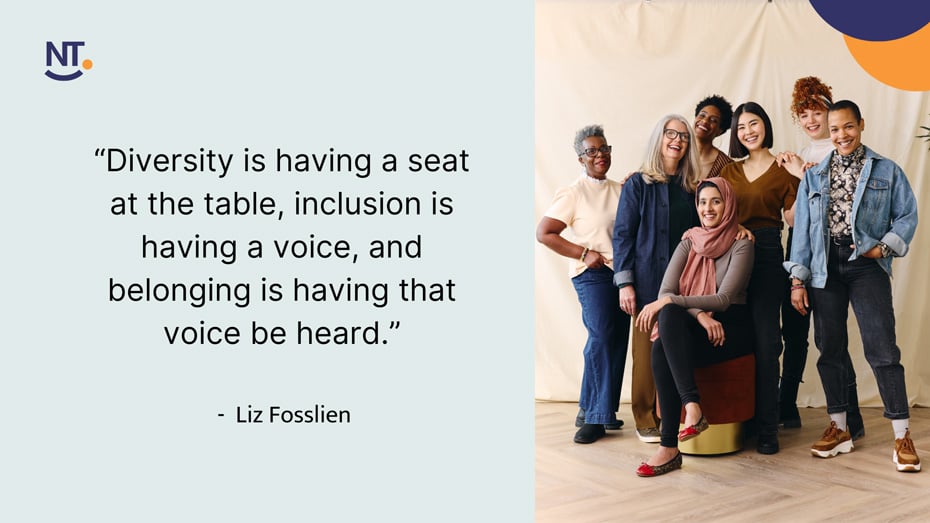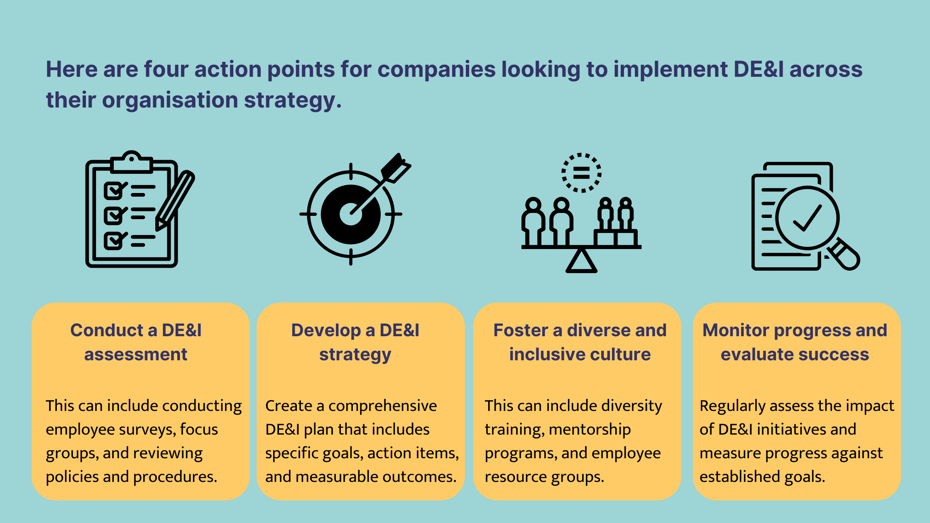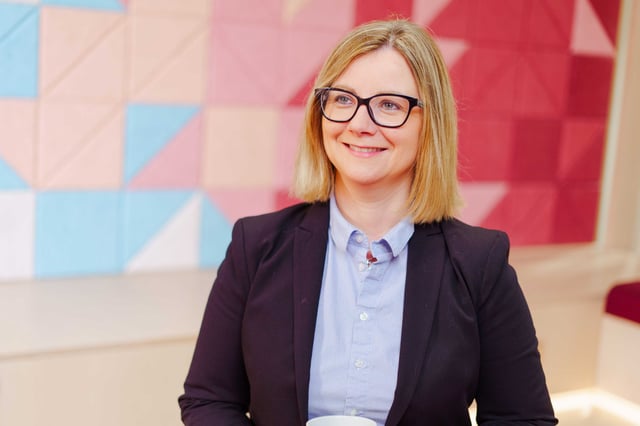What do we mean by Diversity, Equity & Inclusion (DE&I)?
Diversity within an organisation is about having different groups of people represented. We are all unique and our individual identity is made up of our own beliefs, worldviews, and perceptions which in turn influence how we experience and interact with the world. Diversity also includes characteristics such as race, skin colour, gender, sexual orientation, religion, physical or mental ability or disability, socioeconomic background, education, profession, and many more.
Equity is about creating a level playing field for all, it's not about giving everyone the exact same but recognising that some people already have advantages simply by being part of a group that has held power and privilege in society. Equity within an organisation is about distributing your resources based on the needs of the recipients.
An inclusive organisation is an environment where everyone feels equally valued and respected, where they feel a sense of belonging and can participate and leverage their talents and skills.
Research has shown that organisations that embody these elements into their work environment are more innovative, have more engaged employees, and are able to hire and retain top talent. Their teams are more capable of complex problem-solving and have greater financial performance.
The goal of any DEI initiatives should be about embracing the unique talents, experiences, and needs of different people, and creating workplaces that flourish because of their commitment to diversity, equity, and inclusion. Each organisation will have a different approach depending on its own needs, culture and values.
What are the best practices for promoting DEI in the workplace?
Diversity, equity, and inclusion are crucial for the success of any company. A diverse workforce brings different perspectives, experiences, and skills to the table, which can lead to increased creativity, productivity, and innovation. Inclusion ensures that all employees feel valued, respected, and heard, which can lead to
higher employee engagement and retention.
In order to have sustainable change DEI needs to be part of the organisational strategy, goals, and decision-making processes. Efforts should not be down to one group or person, it needs to be owned by everyone and embedded into the culture. Finally, there needs to be accountability around programs, metrics, and policies to ensure that the organisation can see progress toward achieving its goals.
What are the processes that are essential to Diversity, Equity, and Inclusion in an organisation?
Processes that are essential to DEI
Recruitment
Organisations must be intentional in how they recruit a workforce that is representative. Interview processes must be fair and unbiased and those on the hiring panel should be suitably trained on the impact of bias and discrimination.
Promotions and retention
DEI must be integrated into all processes, especially the development of your employees. Mentoring, coaching, and sponsorship in particular may be helpful.
Job Design
This is an area often overlooked by organisations, and they often jump straight to hiring. Undertaking regular reviews of the requirements of a role, along with benefits and remuneration can help reduce potential bias.
Work-Life Balance
The workforce is diverse and opportunities need to be equally diverse in order to attract and retain a variety of employees. Following COVID-19 we have seen a dramatic shift in how we work. Many organisations are moving towards more flexible schedules, making roles part-time, or job share, and looking at ways to be more accommodating for those with caring responsibilities or with disabilities. These strategies and supports allow those with differing needs to be engaged and productive, regardless of their situation.
What challenges do you think companies face when it comes to diversity and inclusion?
Companies may face several challenges when it comes to diversity and inclusion, including unconscious bias in hiring and promotion practices, and lack of representation of underrepresented groups in leadership positions. Although training may help increase awareness around bias and stereotyping a generic workshop will not lead to sustainable behavior change unless it is part of a wider organisational strategy and culture.
Organisations need to have clearly defined goals around DEI and their commitment to it, when it is something that is measurable it is more likely to be achieved. This assists with sustainability which is crucial for the success of DEI in organisations.
How can individuals help support DEI in their workplaces?
Everyone in the organisation has a responsibility to DEI, often it is left to HR to initiate and run programs, when in reality if everyone is not responsible and accountable it will more than likely be a tick-box exercise.
Some ways in which everyone can be supportive include:
- Speak up against discrimination and bias: Individuals should speak up when they witness discrimination or bias, whether it is directed at themselves or others.
- Be an ally: Individuals can be an ally by supporting and advocating for underrepresented groups in the workplace.
- Educate themselves: Individuals should educate themselves on issues related to DEI and actively seek out opportunities to learn more.
- Be open-minded: Individuals should be open-minded and willing to listen to and learn from perspectives different from their own.
- Support initiatives: Individuals can support company-wide initiatives that promote diversity and inclusion and can actively participate in them.
- Encourage open communication: Individuals can encourage open communication, and create a space where everyone can express their opinions and ideas without fear of judgment.
Ultimately DEI work starts and ends with the individual. We need to be open and willing to explore our own identities and the elements that make us unique. Do we truly understand how the words we use create both positive and negative reactions? We as individuals need to be willing and open to challenge our own beliefs as well having the courage to challenge others’ beliefs in a respectful manner.
